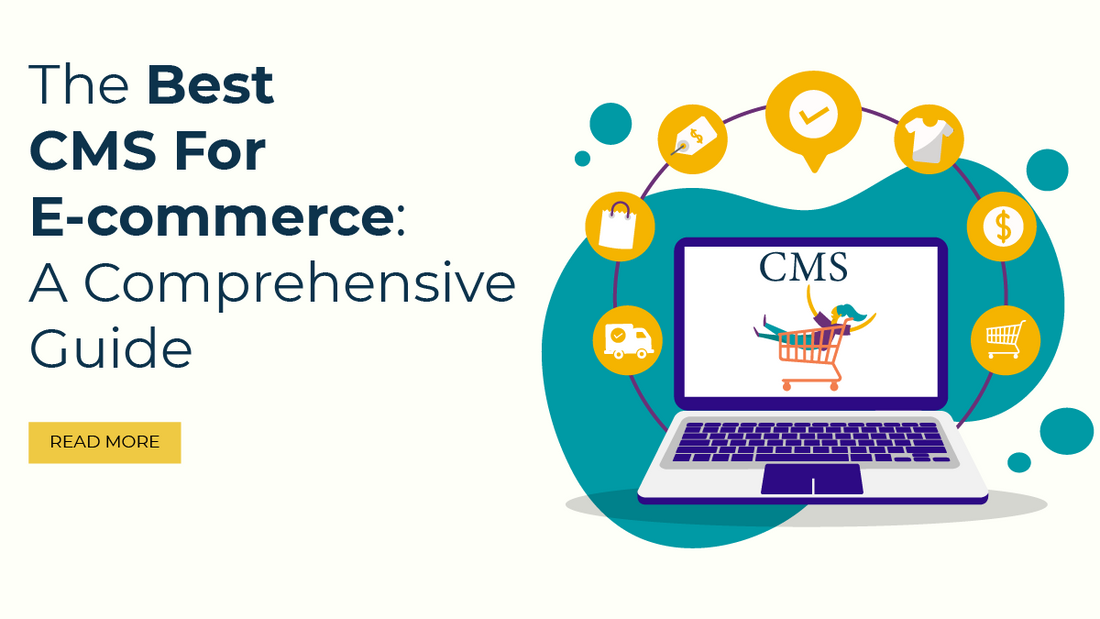
Introduction
In the dynamic world of online commerce, choosing the perfect content management system (CMS) is akin to laying a solid foundation for your store. The right CMS is not just a tool; it's the backbone of your e-commerce website, wielding the power to shape your site's functionality, user experience, and, consequently, your business triumph. Amidst the sea of CMS options available, it's imperative to discern the best CMS for e-commerce that harmonizes with your unique requirements. In this comprehensive guide, we embark on an exploration of the paramount CMS choices tailored explicitly for e-commerce, arming you with the knowledge to make an astute and well-informed decision.
Understanding the gravity of selecting the most fitting CMS for e-commerce is akin to recognizing that your choice is a cornerstone that will underpin the future success of your online business. A CMS stands as the central nervous system of your e-commerce website, orchestrating a symphony of vital functions such as product management, transaction processing, content handling, and customer interaction. The best CMS for e-commerce, in particular, not only offers an intuitive user experience and robust security features but also presents opportunities for extensive customization and efficient inventory management. Its influence extends to optimizing SEO, seamless integration of third-party applications, and, critically, fostering scalability to match the growth trajectory of your business. Conversely, an ill-suited CMS can translate into a burdensome, inefficient, and aesthetically unappealing online store, potentially deterring potential customers and stalling business growth.
The right CMS can enhance your website's performance, allowing you to scale your business, optimize SEO, and integrate third-party applications. Conversely, an ill-suited CMS can result in a cumbersome, inefficient, and unattractive online store.
In the following sections, we will journey through some of the leading CMS options tailored for e-commerce, delving into their unique features and distinctive offerings. By understanding these top contenders and their strengths, you will be well-equipped to make an informed decision aligned with your e-commerce aspirations. Let us embark on this voyage through the e-commerce CMS landscape, guiding you toward a prosperous and seamless online venture.
Top Contenders for the Best CMS for E-commerce
Let's explore some of the leading CMS options tailored for e-commerce:
1. Magento

Magento is a powerhouse in the e-commerce CMS arena, recognized for its robustness, scalability, and extensive customization options. It's an open-source CMS that empowers businesses of all sizes, from small startups to large enterprises. Magento offers an array of features, including product management, customer segmentation, inventory management, and a vast marketplace of plugins and extensions. You can use open-source WordPress themes for such CMS for a better user experience.
Why Magento is Among the Best CMS for E-commerce:
- Scalability to accommodate business growth.
- Extensive customization options for a tailored online store.
- Robust security features to protect sensitive customer data.
- SEO-friendly structure to enhance visibility in search results.
Key Features:
- Scalability: Able to handle the growth of small startups to large enterprises, making it a highly scalable choice.
- Customization: Extensive customization options to tailor your online store based on specific business needs and preferences.
- Security: A robust set of security features to safeguard sensitive customer data and transactions.
- SEO Optimization: SEO-friendly structure for enhancing visibility in search results and driving organic traffic.
Magento is an open-source CMS renowned for its robustness, scalability, and extensive customization options. It offers a wide range of features, including product management, customer segmentation, inventory management, and a vast marketplace of plugins and extensions.
2. Shopify

Shopify is a popular CMS known for its ease of use and quick setup. It's an ideal choice for entrepreneurs and small to medium-sized businesses. Shopify offers a variety of attractive templates and a user-friendly interface, making it simple to create and manage an online store. It covers essential e-commerce features like product management, order processing, and a secure checkout system.
Why Shopify is Among the Best CMS for E-commerce:
- Quick and easy setup, perfect for beginners.
- A wide range of customizable templates for a unique store design.
- Secure payment gateways for safe transactions.
- Mobile-friendly design to cater to a growing mobile customer base.
Key Features:
- Ease of Use: Known for its user-friendly interface and quick setup, making it ideal for entrepreneurs and small to medium-sized businesses.
- Templates: A wide range of customizable templates, allowing you to create a unique and visually appealing online store.
- Payment Gateways: Secure payment gateways for safe and reliable transactions.
- Mobile Optimization: Mobile-friendly design to cater to the increasing number of mobile shoppers.
Shopify is a popular CMS known for its simplicity and quick setup. It's an excellent choice for beginners and small to medium-sized businesses. Shopify provides a variety of attractive templates and a user-friendly interface, simplifying the creation and management of an online store.
3. WooCommerce (WordPress)

WooCommerce is a plugin for WordPress, one of the most popular CMS platforms globally. It seamlessly integrates with a WordPress website to transform it into a functional e-commerce store. WooCommerce offers a plethora of themes, plugins, and customization options, making it a versatile choice for e-commerce businesses. It's highly scalable and supports various payment gateways.
Why WooCommerce is Among the Best CMS for E-commerce:
- Seamless integration with a widely used CMS, WordPress.
- Extensive customization options through plugins and themes.
- User-friendly interface, particularly for those familiar with WordPress.
- Strong community support and a vast knowledge base.
Key Features:
- Integration: Seamless integration with WordPress, a widely used CMS, adds e-commerce functionality to your existing website.
- Customization: Extensive customization options through plugins and themes, giving you the flexibility to tailor your store.
- User-Friendly: Particularly suitable for those familiar with WordPress, offering a user-friendly interface.
- Community Support: Strong community support and a vast knowledge base for guidance and assistance.
WooCommerce is a powerful WordPress e-commerce plugin and one of the most popular CMS platforms globally. It seamlessly integrates with a WordPress website, transforming it into a functional e-commerce store. WooCommerce offers a plethora of themes, plugins, and customization options, making it a versatile choice for e-commerce businesses.
4. BigCommerce

BigCommerce is a comprehensive e-commerce CMS that caters to businesses of all sizes. It provides a range of customizable templates, making it easy to create a visually appealing online store. BigCommerce offers powerful e-commerce features such as product management, order processing, secure payments, and mobile optimization.
Why BigCommerce is Among the Best CMS for E-commerce:
- All-in-one solution with no transaction fees, ideal for growing businesses.
- Scalability to accommodate increased traffic and sales
- SEO-friendly structure for improved search engine visibility
- Excellent customer support and a dedicated community
Key Features:
- All-in-One Solution: A comprehensive e-commerce solution with no transaction fees, ideal for growing businesses and enterprises.
- Scalability: the ability to scale and accommodate increased traffic and sales as your business grows.
- SEO Optimization: SEO-friendly structure to improve search engine visibility and drive organic traffic
- Customer Support: Excellent customer support and an active community for assistance and knowledge sharing.
BigCommerce is a comprehensive e-commerce CMS suitable for businesses of all sizes. It provides a range of customizable templates, making it easy to create an attractive online store. BigCommerce offers powerful e-commerce features, including product management, order processing, secure payments, and mobile optimization.
Conclusion
Selecting the best CMS for e-commerce is a pivotal decision that can influence the trajectory of your online business. Consider your business’s specific needs, scale, customization requirements, and budget when evaluating CMS options. Whether it’s Magento, Shopify, WooCommerce, or BigCommerce, each CMS has its strengths and can serve as an excellent platform to build a successful e-commerce venture. Additionally, integrating premium WordPress themes can elevate the visual appeal and functionality of your website, giving it a polished and professional look. Take the time to assess and choose the CMS that aligns with your goals and ensures a seamless and secure shopping experience for your customers. Happy e-commerce journey!





















